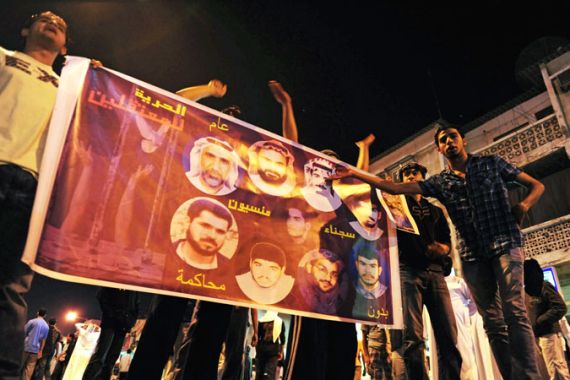Saudi scholars forbid protest calls
Warning follows similar announcement by interior ministry that security forces were authorised to crack down.

 |
| Small protests have taken place in Eastern Province cities such as Awwamiya [Reuters] |
Saudi Arabia’s leading religious authorities have issued a statement forbidding public protests and petitions for reforms in the country.
The warning from Saudi’s council of senior scholars on Sunday follows a similar announcement by secular authorities a day earlier.
The 10-member council’s statement, carried by state news agency SPA, said that “the correct way in sharia [Islamic law] of realising common interest is by advising, which is what the Prophet Muhammad established”.
“Reform and advice should not be via demonstrations and ways that provoke strife and division, this is what the religious scholars of this country in the past and now have forbidden and warned against,” the statement said.
“The council warns of deviant ideological and party-political connections since this nation is one and will adhere to the ways of the pious ancestors.
“The kingdom has not and will not allow ideas from the West or the East that take away from this Islamic identity and divide the unity of the whole.”
A day earlier, the interior ministry said that protests violate Islamic law and the kingdom’s traditions, and reminded potential demonstrators that security forces were authorised to crack down on public protests.
Protesters arrested
Saudi authorities have grown nervous after more than 17,000 people backed a call on the social networking website Facebook to hold two demonstrations in the kingdom this month, the first scheduled to take place on March 11.
In the capital Riyadh on Friday, dozens of men gathered at the exit of the al-Rajhi mosque, one of the city’s most important, repeating slogans denouncing “oppression” and the monarchy, according to witnesses.
Three men were arrested, witnesses said.
There were also demonstrations last week in the area of Qatif and neighbouring Awwamiya in Saudi’s Eastern Province, with demonstrators from the country’s minority Shia population calling for the release of prisoners they said were bing held without trial.
The area is sensitive as the province is near Bahrain, which has also seen protests in recent weeks by the country’s majority Shia Muslim against their Sunni Muslim rulers.
Videos posted on the March 11 Facebook page appeared to show heavily armed police confronting protesters.
Twenty-two people were arrested following the Qatif demonstrations, Saudi activists said.
Activist freed
Authorities made a limited concession on Sunday, according to a report by the Associated Press, by releasing Tawfiq al-Amer, a Shia cleric who was arrested last week after he called for a constitutional monarchy.
Sultan al-Qassemi, a columnist for the UAE’s National newspaper, told Al Jazeera: “Protests have always been shunned in Saudi Arabia, and they’ve never been allowed by law, so this is not a new development it’s just a confirmation of the ban.
“However, we’ve seen perhaps several hundred – some say several thousand – people go out in Qatif in the Eastern Province. I don’t think this ban is going to change their mind, these individuals expect some reforms.”
With pro-democracy uprisings throughout the Arab world, Gulf states are increasingly concerned. Both Bahrain and Oman have witnessed protests in recent weeks.
Asked what democratic model Gulf states could turn to, al-Qassemi said: “Kuwait is decades ahead of any Gulf state. Kuwaiti women several years ago won the right to vote and run in the parliament through democratic means.
“Kuwait is two or three decades ahead of any other Gulf states. The closest I can see to it is Bahrain, which has a very active parliament, and then of course the other Gulf states come behind.”